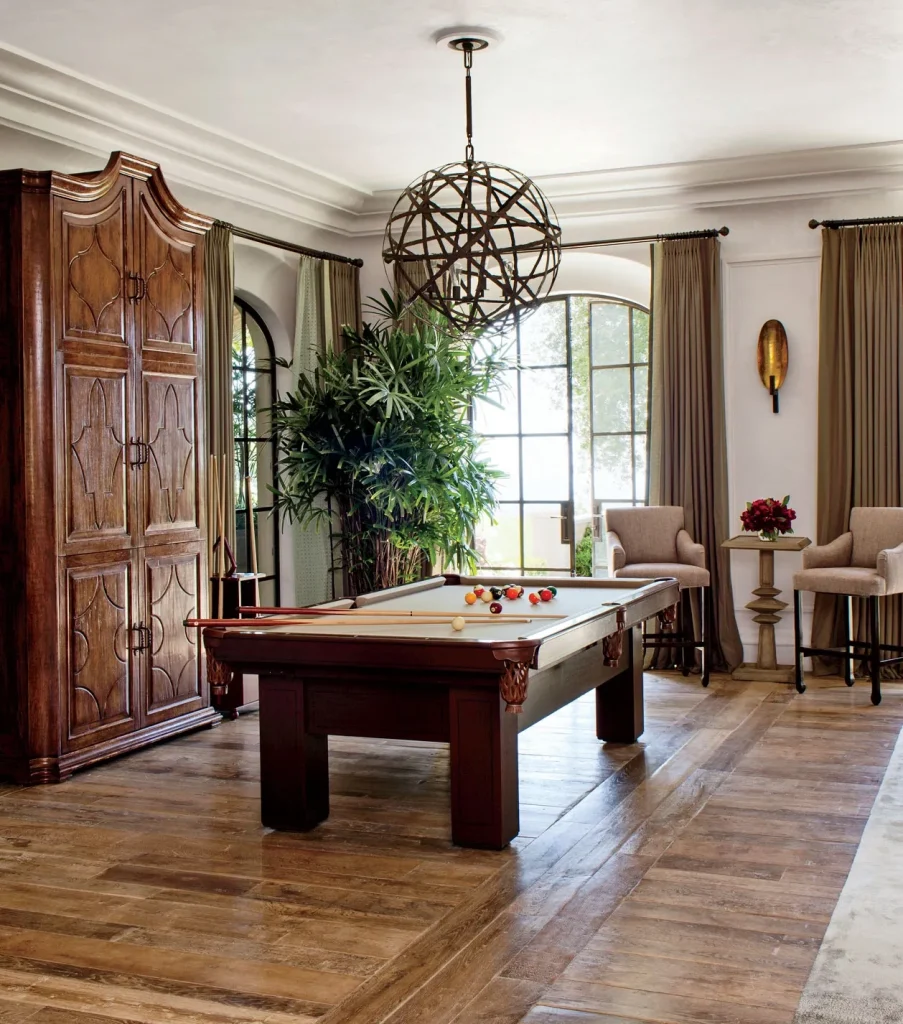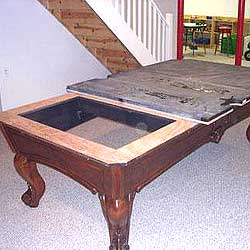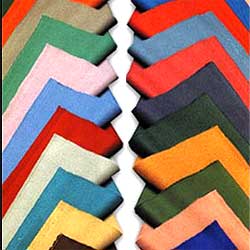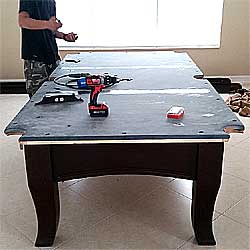Call us; 1-508-254-5671
Hingham, MA
Pool Table Billiard Movers and Repair
With 30 years of pool table best practices. Hingham, Massachusetts
What is the solution for professional repair, re-felt, re-level of my pool billiard table? What is the best option for a safe billiard pool table moving company?
Safe pool table moving method.
I acquired a billiard table from the web, and who will install and move it? Corner Pocket Pool Table Services, Your safest, best choice. In Hingham, MA, Massachusetts MA, New Hampshire NH, Vermont VT, Rhode Island RI, Pool billiard table work.
Pool table felt replacement and movers, pool table moving and repair in Hingham, Massachusetts neighborhoods for over thirty years. We have been moving and repairing all brands and styles of pool tables.
Corner Pocket Pool Table Service is run entirely by family, and covering Hingham, Massachusetts. Billiard and pool table movers and service experts.
We will re-felt and tune-up your billiard table, or transport your table from Hingham to anywhere within new england.
Five star ratings and reviews, Hingham, Massachusetts.

Hingham, MA Local Pool Table Movers
Hingham, MA Local Billiard Table Movers
Move a pool table from Hingham, MA
Move a pool table to Hingham, MA
Companies that move Pool Tables
Hingham, MA Re-Felting Pool Tables
Hingham, MA Pool Table Repairs
Hingham, MA Pool Table Refelting
Hingham, MA Refelting A Pool Table
Hingham, MA Pool Table Mover

Hingham ( HING-əm) is a town in metropolitan Greater Boston on the South Shore of the U.S. state of Massachusetts in northern Plymouth County. At the 2020 census, the population was 24,284. Hingham is known for its colonial history and location on Boston Harbor. The town was named after Hingham, Norfolk, England, and was first settled by English colonists in 1633.
The town of Hingham was dubbed “Bare Cove” by the first colonizing English in 1633, but two years later was incorporated as a town under the name “Hingham.” The land on which Hingham was settled was deeded to the English by the Wampanoag sachem Wompatuck in 1655. The town was within Suffolk County from its founding in 1643 until 1803, and Plymouth County from 1803 to the present. The eastern part of the town split off to become Cohasset in 1770. The town was named for Hingham, a market town in the English county of Norfolk, East Anglia, whence most of the first colonists came, including Abraham Lincoln’s ancestor Samuel Lincoln (1622–1690), his first American ancestor, who came to Massachusetts in 1637. A statue of President Lincoln adorns the area adjacent to downtown Hingham Square.
Hingham was born of religious dissent. Many of the original founders were forced to flee their native town in Norfolk with both their vicars, Rev. Peter Hobart and Rev. Robert Peck, when they fell afoul of the strict doctrines of Anglican England. Peck was known for what the eminent Norfolk historian Rev. Francis Blomefield called his “violent schismatical spirit”. Peck lowered the chancel railing of the church, in accord with Puritan sentiment that the Anglican church of the day was too removed from its parishioners. He also antagonized ecclesiastical authorities with other forbidden practices.
Hobart, born in Hingham, Norfolk, in 1604 and, like Peck, a graduate of Magdalene College, Cambridge, sought shelter from the prevailing discipline of the high church among his fellow Puritans. The cost to those who emigrated was steep. They “sold their possessions for half their value,” noted a contemporary account, “and named the place of their settlement after their natal town.” (The cost to the place they left behind was also high: Hingham was forced to petition Parliament for aid, claiming that the departure of its most well-to-do citizens had left it hamstrung.)[citation needed]
While most of the early Hingham settlers came from Hingham and other nearby villages in East Anglia, a few Hingham settlers like Anthony Eames came from the West Country of England. The early settlers of Dorchester, Massachusetts, for instance, had come under the guidance of Rev. John White of Dorchester in Dorset, and some of them (like Eames) later moved to Hingham. Accounts from Hingham’s earliest years indicate some friction between the disparate groups, culminating in a 1645 episode involving the town’s “trainband”, when some Hingham settlers supported Eames, and others supported Bozoan Allen, a prominent early Hingham settler and Hobart ally who came from King’s Lynn in Norfolk, East Anglia. Prominent East Anglian Puritans like the Hobarts and the Cushings, for instance, were used to holding sway in matters of governance. Eventually the controversy became so heated that John Winthrop and Thomas Dudley were drawn into the fray; minister Hobart threatened to excommunicate Eames.
The bitter trainband controversy dragged on for several years, culminating in stiff fines. Eventually a weary Eames, who was in his mid-fifties when the controversy began and who had served Hingham as first militia captain, a selectman, and Deputy in the General Court, threw in the towel and moved to nearby Marshfield where he again served as Deputy and emerged as a leading citizen, despite his brush with the Hingham powers-that-be.[citation needed]
Although the town was incorporated in 1635, the colonists didn’t get around to negotiating purchase from the Wampanoag, the Native American tribe in the region, until three decades later. On July 4, 1665, the tribe’s chief sachem, Josiah Wompatuck, sold the township to Capt. Joshua Hobart (brother of Rev. Peter Hobart) and Ensign John Thaxter (father of Col. Samuel Thaxter), representatives of Hingham’s colonial residents. Having occupied the land for 30 years, the Englishmen presumably felt entitled to a steep discount. The sum promised Josiah Wompatuck for the land encompassing Hingham was to be paid by two Hingham landowners: Lieut. John Smith and Deacon John Leavitt, who had been granted 12 acres (49,000 m) on Hingham’s Turkey Hill earlier that year. Now the two men were instructed to deliver payment for their 12-acre (49,000 m2) grant to Josiah the chief Sachem. The grant to Smith and Leavitt — who together bought other large tracts from the Native Americans for themselves and their partners—was “on condition that they satisfy all the charge about the purchase of the town’s land of Josiah—Indian sagamore, both the principal purchase and all the other charge that hath been about it”. With that payment the matter was considered settled.
Diverse Tables
From basic models, to less common; custom, hand-made tables and everything in the middle. We’ve seen a great many them. Not to say that we have really seen each model of table that there is… The standards are much the same starting with one then onto the next. Occasionally we see a new technique. We love to learn these, and it is always enjoyable to have a finished product you will love!Distinctive Houses
From Landmark houses in Hingham, to delightful little homes, we’ve placed tables in every one of them.
Also, we treat every house like our own. We anticipate giving you the best working pool table you’ve ever played on.

